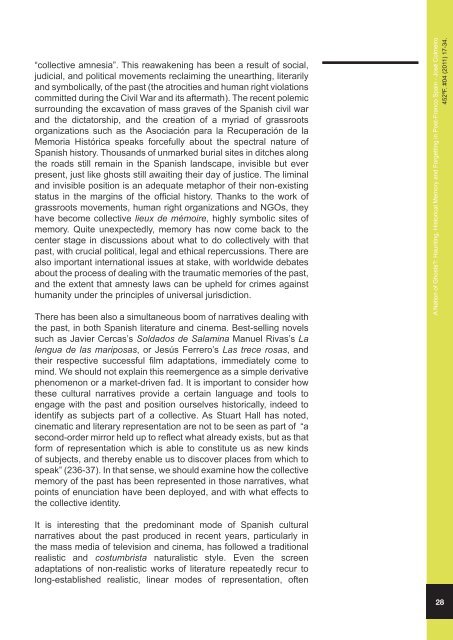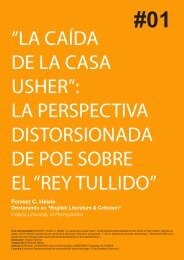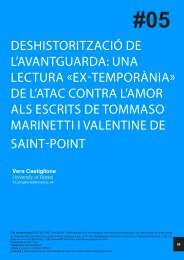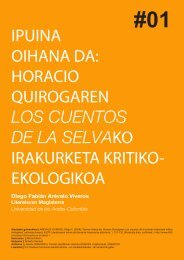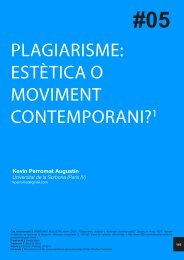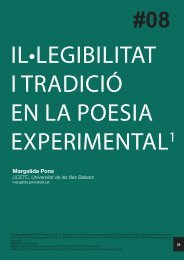a nation of ghosts?: haunting, historical memory and ... - 452ºF
a nation of ghosts?: haunting, historical memory and ... - 452ºF
a nation of ghosts?: haunting, historical memory and ... - 452ºF
You also want an ePaper? Increase the reach of your titles
YUMPU automatically turns print PDFs into web optimized ePapers that Google loves.
“collective amnesia”. This reawakening has been a result <strong>of</strong> social,<br />
judicial, <strong>and</strong> political movements reclaiming the unearthing, literarily<br />
<strong>and</strong> symbolically, <strong>of</strong> the past (the atrocities <strong>and</strong> human right violations<br />
committed during the Civil War <strong>and</strong> its aftermath). The recent polemic<br />
surrounding the excavation <strong>of</strong> mass graves <strong>of</strong> the Spanish civil war<br />
<strong>and</strong> the dictatorship, <strong>and</strong> the creation <strong>of</strong> a myriad <strong>of</strong> grassroots<br />
organizations such as the Asociación para la Recuperación de la<br />
Memoria Histórica speaks forcefully about the spectral nature <strong>of</strong><br />
Spanish history. Thous<strong>and</strong>s <strong>of</strong> unmarked burial sites in ditches along<br />
the roads still remain in the Spanish l<strong>and</strong>scape, invisible but ever<br />
present, just like <strong>ghosts</strong> still awaiting their day <strong>of</strong> justice. The liminal<br />
<strong>and</strong> invisible position is an adequate metaphor <strong>of</strong> their non-existing<br />
status in the margins <strong>of</strong> the <strong>of</strong>ficial history. Thanks to the work <strong>of</strong><br />
grassroots movements, human right organizations <strong>and</strong> NGOs, they<br />
have become collective lieux de mémoire, highly symbolic sites <strong>of</strong><br />
<strong>memory</strong>. Quite unexpectedly, <strong>memory</strong> has now come back to the<br />
center stage in discussions about what to do collectively with that<br />
past, with crucial political, legal <strong>and</strong> ethical repercussions. There are<br />
also important inter<strong>nation</strong>al issues at stake, with worldwide debates<br />
about the process <strong>of</strong> dealing with the traumatic memories <strong>of</strong> the past,<br />
<strong>and</strong> the extent that amnesty laws can be upheld for crimes against<br />
humanity under the principles <strong>of</strong> universal jurisdiction.<br />
There has been also a simultaneous boom <strong>of</strong> narratives dealing with<br />
the past, in both Spanish literature <strong>and</strong> cinema. Best-selling novels<br />
such as Javier Cercas’s Soldados de Salamina Manuel Rivas’s La<br />
lengua de las mariposas, or Jesús Ferrero’s Las trece rosas, <strong>and</strong><br />
their respective successful film adaptations, immediately come to<br />
mind. We should not explain this reemergence as a simple derivative<br />
phenomenon or a market-driven fad. It is important to consider how<br />
these cultural narratives provide a certain language <strong>and</strong> tools to<br />
engage with the past <strong>and</strong> position ourselves <strong>historical</strong>ly, indeed to<br />
identify as subjects part <strong>of</strong> a collective. As Stuart Hall has noted,<br />
cinematic <strong>and</strong> literary representation are not to be seen as part <strong>of</strong> “a<br />
second-order mirror held up to reflect what already exists, but as that<br />
form <strong>of</strong> representation which is able to constitute us as new kinds<br />
<strong>of</strong> subjects, <strong>and</strong> thereby enable us to discover places from which to<br />
speak” (236-37). In that sense, we should examine how the collective<br />
<strong>memory</strong> <strong>of</strong> the past has been represented in those narratives, what<br />
points <strong>of</strong> enunciation have been deployed, <strong>and</strong> with what effects to<br />
the collective identity.<br />
It is interesting that the predominant mode <strong>of</strong> Spanish cultural<br />
narratives about the past produced in recent years, particularly in<br />
the mass media <strong>of</strong> television <strong>and</strong> cinema, has followed a traditional<br />
realistic <strong>and</strong> costumbrista naturalistic style. Even the screen<br />
adaptations <strong>of</strong> non-realistic works <strong>of</strong> literature repeatedly recur to<br />
long-established realistic, linear modes <strong>of</strong> representation, <strong>of</strong>ten<br />
A Nation <strong>of</strong> Ghosts?: Haunting, Historical Memory <strong>and</strong> Forgetting in Post-Franco Spain - José Colmeiro<br />
<strong>452ºF</strong>. #04 (2011) 17-34.<br />
28


